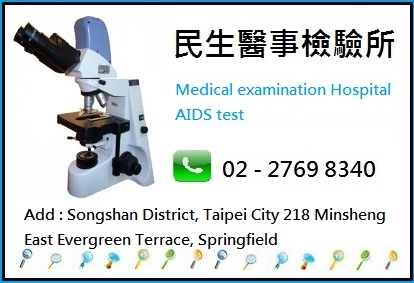AIDS test Taiwan - Taipei AIDS screening
HIV, syphilis and hepatitis
The Centers for Disease Control and Prevention (CDC) encourages HIV testing, at least once, as a routine part of medical care if you're an adolescent or adult between the ages of 15 and 65. Younger teens should be tested if they have a high risk of an STI. The CDC advises yearly HIV testing if you are at high risk of infection.
Hepatitis C screening is recommended for everyone born between 1945 and 1965. The incidence of hepatitis C is high in this age group, and the disease often has no symptoms until it's advanced. Vaccines are available for both hepatitis A and B if screening shows you haven't been exposed to these viruses.
Request testing for HIV, syphilis and hepatitis if you:
Test positive for another STI, which puts you at greater risk of other STIs
Have had more than one sexual partner since your last test
Use intravenous (IV) drugs
Are a man who has sex with men
Are pregnant or planning on becoming pregnant
Have been forced to have intercourse or engage in sexual activity against your will
Your doctor tests you for syphilis by taking either a blood sample or a swab from any genital sores you might have. The sample is examined in a laboratory. A blood sample is taken to test for HIV and hepatitis.
Genital herpes
No good screening test exists for herpes, a viral infection that can be transmitted even when a person doesn't have symptoms. Your doctor may take a tissue scraping or culture of blisters or early ulcers, if you have them, for examination in a laboratory. But a negative test doesn't rule out herpes as a cause for genital ulcerations.
A blood test also may help detect a herpes infection, but results aren't always conclusive. Some blood tests can help differentiate between the two main types of the herpes virus. Type 1 is the virus that more typically causes cold sores, although it can also cause genital sores. Type 2 is the virus that more typically causes genital sores. Still, the results may not be totally clear, depending on the sensitivity of the test and the stage of the infection. False-positive and false-negative results are possible.
HPV
Certain types of human papillomavirus (HPV) can cause cervical cancer while other varieties of HPV can cause genital warts. Most sexually active people become infected with HPV at some point in their lives, but never develop symptoms. The virus typically disappears within two years.
No HPV screening test is available for men, in whom the infection is diagnosed only by visual inspection or biopsy of genital warts. In women, HPV testing involves:
Pap test. Pap tests, which check the cervix for abnormal cells, are recommended every three years for women between ages 21 and 65.
HPV test. Women over 30 may be offered the option to have the HPV test along with a Pap test every five years if previous tests were normal. Women between 21 and 30 will be given an HPV test if they've had abnormal results on their Pap test.
HPV has also been linked to cancer of the vulva, vagina, penis, anus, and mouth and throat. Vaccines can protect both men and women from some types of HPV, but they are most effective when administered before sexual activity begins.
Business Hours:
From Monday to Saturday, 9:00 a.m ~ 22:00 p.m
Sunday, 9:00 a.m. ~12:00 p.m
Phone Number: 886-02-27698340
Medical institutions address:
1F., No.218, Sec. 5, Minsheng E. Rd., Songshan Dist.,
Taipei City 105, Taiwan (R.O.C.)
Taiwan (R.O.C.) Medical Institutions Code : 9401010374




 留言列表
留言列表